Keynote speakers
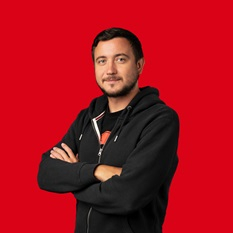
Mr. Nikita Gordeev, Snoonu
BIOGRAPHY
Nikita is the Chief Technology Officer at Snoonu which is the fastest growing technology company in Qatar. He has over 10 years of dedication to software development and leadership roles in the Banking, Telecommunication and E-Commerce sectors. Empowered by master's degree in information security and advanced studies at MIT. He is always open and eager to share knowledge and insights for those who are interested.
Title: Scaling AI in e-commerce
Abstract: A lot of companies struggle to start AI adoption and fail rate is high. We will discuss how to start AI project in the entreprise, measure success and scale it. With real life use cases at Snoonu - fastest growing Qatar tech company."
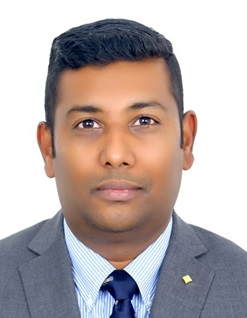
Mr. Jayanth Vasudevan, Yokogawa
BIOGRAPHY
AGM Digital Enterprise Solutions at Yokogawa Middle East & Africa B.S.C.
Jayanth Vasudevan brings over 20 years of extensive experience in digital enterprise solutions to his role as Assistant General Manager at Yokogawa Middle East & Africa B.S.C. Throughout his career, Jayanth has demonstrated a strong commitment to innovation and excellence, leading several high-impact projects that have significantly contributed to the advancement of digital solutions within the industry.
At Yokogawa, Jayanth has successfully implemented AI-based autonomous control systems, which have enhanced operational efficiencies and optimized performance across various processes. His expertise in dynamic simulation projects has been instrumental in achieving substantial profit improvements for the company. Jayanth's ability to leverage cutting-edge technologies to solve complex challenges has been a cornerstone of his professional journey.
Title: Transforming Industrial Automation to Industrial Autonomy: Yokogawa's Vision Through Artificial Intelligence
Abstract: The integration of Artificial Intelligence (AI) is revolutionizing industrial automation, driving a shift towards industrial autonomy. This presentation explores Yokogawa's vision for transforming traditional automation systems into fully autonomous operations through AI technologies. Yokogawa leads the shift towards industrial autonomy with several initiatives:
- AI-Driven Control Systems: Real-time adaptation to changing conditions for optimized performance.
- Smart Sensors and IoT Integration: Enhanced data collection and connectivity across operations.
- Predictive Maintenance Solutions: Proactively predicting equipment failures, reducing maintenance costs.
This presentation delves into Yokogawa’s AI initiatives, showcasing their transformative impact on industrial automation, paving the way for a new era of industrial autonomy.
External speakers
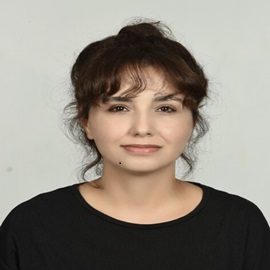
Dr. Merve Astekin, Norway
BIOGRAPHY
Merve Astekin is a Research Scientist in the Trustworthy Green IoT Software (GIoT) Research Group at SINTEF Digital. Before joining SINTEF, she was a postdoctoral fellow at Simula Research Laboratory in Norway. She received her Ph.D. degree in Computer Science from Ozyegin University, Türkiye. She holds B.Sc. and M.Sc. degrees from the Department of Computer Engineering at Istanbul Technical University. For almost a decade, she worked as a researcher at TÜBİTAK BİLGEM (Informatics and Information Security Research Center) in Türkiye, where she was involved in large-scale software development projects, focusing on cloud computing, big data analytics, simulation systems, and software testing & quality. Her research interests include AI for sustainable software engineering, with a particular focus on software reliability and maintainability.
Title: Advancing Software Engineering Using LLMs
Abstract: Large Language Models (LLMs) have emerged as transformative tools not only for natural language processing but also for software engineering. This presentation will explore the evolving relationship between LLMs and the future of software engineering. Attendees will gain insights into the potential of LLMs to streamline various stages of the software development lifecycle (SDLC), from requirements gathering and code generation to testing and maintenance. Through small case studies, we will demonstrate practical applications of LLMs in software development tasks such as code refactoring, documentation generation, and technical debt detection, highlighting real-world examples of how LLMs can assist developers and teams. Additionally, the presentation will address the limitations and risks associated with applying LLMs in software engineering, including issues of code quality, reliability, energy usage, and ethical concerns around over-reliance on automated systems. We will also discuss strategies to detect and mitigate these risks. By the end of the session, participants will have a comprehensive understanding of how LLMs can both advance and challenge traditional software engineering practices.
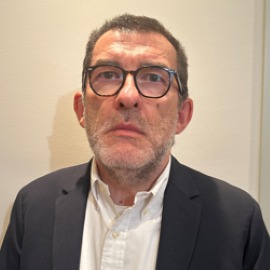
Prof. Luciano Baresi, Italy
BIOGRAPHY
Luciano Baresi is full professor at the Politecnico di Milano - Dipartimento di Elettronica, Informazione e Bioingegneria, where he earned both his laurea (master) degree and PhD in computer science. Luciano was visiting professor at University of Oregon (USA) and visiting researcher at University of Paderborn (Germany). Luciano was program chair for ICECCS, FASE, ICWE, ICSOC, SEAMS, ESEC/FSE, and SCC, and general chair for WICSA/CompArch. He is currently the steering committee chair of ESEC/FSE. Luciano has co-authored diverse papers and a book in Italian. His research interests are in the broad area of software engineering. At the beginning he was interested in formal approaches for modeling and specification languages, he then moved to UML and the design of Web applications. Currently, he is interested in distributed systems, service-based applications, and in the different aspects of mobile, self-adaptive, and pervasive software systems.
Title: Software Engineering for ML-based systems
Abstract: The talk will start introducing why ML-based systems need Software Engineering. One could easily say that these are software systems, and thus known Software Engineering solutions are good enough, but ML-based systems have some peculiar characteristics that must be dealt with properly. Existing techniques must be tailored, and maybe new methods and solutions are needed to define a sound software process as basis to conceive and develop complete systems (and not only their embedded ML components). The presentation will then touch the main phases of software development, maintenance, and operation to identify new needs, existing solutions, and open issues.
The last part of the presentation will discuss some first experiences carried out in our research group and will draw some conclusions.
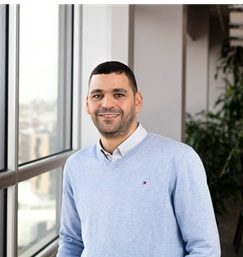
Prof. Belkacem Chikhaoui, Canada
BIOGRAPHY
Dr. Belkacem Chikhaoui is a professor of data science and artificial intelligence in the Department of Science and Technology at TELUQ University, Montreal, Canada. He holds the Canada Research Chair in Multimodal Data Mining and is a member of the Applied Artificial Intelligence Institute. From 2018 to 2022, he served as the Scientific Director of the LICEF Research Institute at TELUQ University.
Dr. Chikhaoui is also an adjunct professor in the Department of Computer Science at the University of Sherbrooke and a lab director at the CRIUGM (Research Center of the University Geriatric Institute of Montreal), University of Montreal.
He has published more than 80 research papers in leading journals and conferences of artificial intelligence. His research interests include data mining, machine learning, artificial intelligence, big data, social network analysis, causality discovery, sequence mining, and recommender systems. Dr. Chikhaoui’s work combines innovative fundamental research with practical industrial applications. He has also secured several research grants from Canadian funding agencies such as NSERC, FRQ, and others.
Dr. Chikhaoui earned a M.Sc. and a Ph.D. in Computer Science from the University of Sherbrooke in 2007 and 2013, respectively. He completed his postdoctoral research at the Toronto Rehabilitation Institute, University of Toronto, Canada.
Title: Transformers in AI: from theoretical foundations to practical implementations
Abstract: This lecture will provide a comprehensive journey through the world of transformers, starting with their theoretical foundations, including self-attention mechanisms and model architecture, and progressing to real-world implementation. Attendees will gain insights into why transformers have revolutionized natural language processing and other AI domains, explore their key advancements, and learn practical techniques for implementing, visualizing and fine-tuning transformer-based models in various applications.
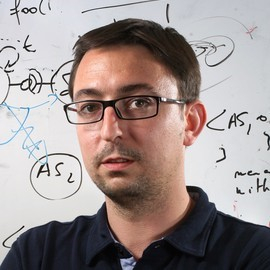
Prof. Benoit Combemale, France
BIOGRAPHY
Benoit Combemale is a full Professor of Software Engineering at the University of Rennes where he is co-leading the research team DiverSE joint to the IRISA and INRIA labs. He is also an adjunct researcher in the SM@RT team of the IRIT labs in Toulouse, and Chief Science Advisor for TwiinIT, a startup specializing in Digital Twins. He is currently serving as Editor-in-Chief for the International Journal on Software and Systems Modeling (SoSyM), editorial board member for the journals SQJ and JOT, and steering committee member for the conferences MODELS, SLE, ICT4S and EdtConf. Prof. Combemale is interested in software engineering, including model driven software and systems engineering (MDE), software language engineering (SLE) and software validation & verification (V&V); mostly in the context of cyber-physical systems and scientific computing. Prof. Combemale has been a Full Professor at the University of Toulouse, and a Visiting Professor at Colorado State University and McGill University. More information at http://combemale.fr
Title: Engineering Digital Twins
Abstract: Digital twins promise tremendous potential for gaining insights, optimize operations, and improve decision-making for natural systems as well as engineered cyber-physical systems across various industries, including manufacturing, healthcare, transportation, and more. Recent developments show that Model-Driven Engineering (MDE) can play a central role in systematically leveraging the potential of digital twins, and many researchers from the MDE community have applied MDE technology to build digital twins in recent years. However, software engineering practices for engineering digital twins are only in their infancy. In this talk, I am presenting concrete case studies, reviewing recent contributions, as well as identifying and discussing some key remaining challenges to realize the vision.
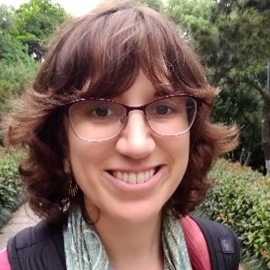
Dr. Lara Lloret Iglesias, Spain
BIOGRAPHY
Lara Lloret Iglesias is a Senior Scientist at the Spanish National Research Council (CSIC). She earned her Ph.D. in particle physics from the University of Oviedo, focusing on the search for the Higgs boson. She then worked as a postdoctoral researcher at the Laboratory of Instrumentation and Experimental Particle Physics in Lisbon, where she conducted searches for new physics within the CMS experiment at CERN's LHC. From 2015 to 2017, she developed the online data acquisition system for the CT-PPS experiment at CERN. Since 2017, she has been working in the Advanced Computing Group at the Institute of Physics of Cantabria, where she has specialized in developing Deep Learning applications primarily focused on healthcare, particularly medical imaging. She is also the director of the Master's program in Data Science organized by the University of Cantabria and the International University Menéndez Pelayo. Additionally, she is a member of the executive committee of AIHUB.CSIC, which is responsible for consolidating a scientific collaboration network of CSIC centers aimed at addressing the future challenges of AI. She has numerous publications in high-impact journals as well as a significant number of presentations at international conferences. She has recently published a book with Catarata titled "Artificial Intelligence and Medicine."
Title: The eyes of artificial intelligence
Abstract: This talk will cover the fundamental principles of image processing in artificial intelligence, focusing on how AI systems use visual data to perceive and interpret the world. We'll begin by discussing key concepts that form the foundation of AI-driven image analysis. We will then explore various applications, including medical imaging, and highlight how these technologies are transforming industries and science. Additionally, we'll delve into the growing field of generative AI, where models create new images and visual content based on existing data. Finally, the talk will address some of the main challenges facing the future of AI, especially in sensitive contexts like healthcare. As we look ahead, understanding these issues will be critical to advancing the field responsibly and effectively.
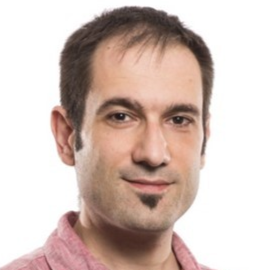
Prof. Felipe Meneguzzi, Scotland
BIOGRAPHY
Professor Felipe Meneguzzi is Chair in Computing Science at the University of Aberdeen and Bridges Professor at the Pontifical Catholic University of Rio Grande do Sul (PUCRS). He received his PhD in Computer Science from King's College London (KCL). Prior to his current appointment Felipe was Professor of AI at PUCRS, a Research Fellow at Carnegie Mellon University (CMU) and prior to his academic career he was a Technical Leader at Hewlett Packard. Felipe's research focuses on reasoning mechanisms for autonomous agents, with a focus on integrating different approaches to achieve not only efficient but also human-aware behavior. To this end, Felipe has contributed with approaches involving planning, machine learning and logic spanning the width of modern AI research. He was recognized as a highly productive researcher in Brazil (PQ Fellow) and received numerous awards for his work, service, and through his students. His work received awards such as the AIJ Prominent Paper (2024), AAMAS Best Blue-Sky Paper (2024), two Google Research Awards for Latin America (2016, 2019), as well as being the winner of the 2020 International Planning Competition. Service recognitions include best SPC member for AAMAS 2021 and best PC member for PRIMA 2013. His students received prizes such as the best AI thesis in Brazil at BRACIS (2020), and best student paper at IJCNN (2017), among others.
Title: State of the art and direction of travel
Abstract: Goal recognition aims to infer an agent's goal from a sequence of observations. While most existing approaches often rely on manually engineered domains and discrete representations, recent work has tried to obviate the need for such domains using machine learning. Before explaining the state of the art, the talk formally introduces the automated planning and problem of goal recognition. The talk then covers recent methods we developed towards model free reinforcement learning applied to the problem of goal recognition. We start with tabular methods that show the viability of such techniques and then show how we can employ deep reinforcement learning methods to overcome the usual problems of partial observability and noise. We proceed to discussing the interplay of such methods with agent architectures pointing to the future of research on machine learning and reasoning.
Internal speakers
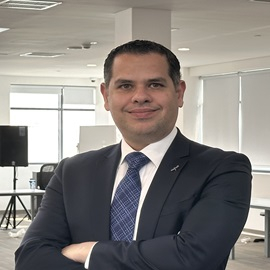
Dr Ahmad Abdel-Hafez, UDST
BIOGRAPHY
Dr. Ahmad Abdel-Hafez is an accomplished data scientist in healthcare, specializing in applying machine learning (ML) algorithms to solve clinical problems using electronic health records (EHR). Before working as an assistant professor at the University of Doha for Science and Technology (UDST), Dr. Abdel-Hafez's spent several years collaborating with research teams, clinicians, and data experts to deliver impactful projects, within Queensland Health, Australia. He has played a pivotal role in leveraging data-driven insights to enhance clinical decision-making and optimize operational efficiency. He has fostered interdisciplinary connections with institutes, clinicians, and hospitals, leading successful grant applications and mentoring the next generation of researchers. His notable contributions include leading projects such as personalized dosing systems and automated triaging of outpatient referrals, showcasing his dedication to driving positive change in healthcare through data science. Dr. Ahmad co-supervised 3 PhD students to graduation and currently co-supervising 3 more PhD students. He attracted many research grants and funding in the area of AI in healthcare.
Title: Machine Learning Model Development and Implementation in Healthcare
Abstract: Machine learning (ML) has transformative potential in healthcare, enhancing clinical decision-making, diagnosis, and patient care. This talk explores the end-to-end process of ML model development and implementation in healthcare, focusing on the unique challenges and considerations of this domain. We will discuss critical steps such as data preprocessing, model selection, and performance evaluation, emphasizing the need for rigorous validation to ensure clinical relevance. Additionally, we’ll address regulatory considerations, data privacy, and ethics, which are essential in deploying models in real-world healthcare settings. In this session, we will discuss the importance of following responsible AI principals for AI development and finally, shed the lights on current and future research opportunities in healthcare.
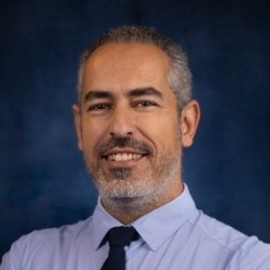
Prof. Reda Bendraou, UDST
BIOGRAPHY
Reda Bendraou is a Professor in Software Engineering at the University of Doha for Science and Technology. Prior to this, he held the position of Professor at Sorbonne University and was conducting his research at the LIP6 (Laboratoire d’ Informatique de Paris 6). In 2015, Reda embarked on a visiting researcher/lecturer role at the Computer Science Lab, University of Massachusetts, Amherst, collaborating with Professors Lori Clarke and Leon Osterweil. Additionally, in 2017, he served as an invited professor at the prestigious KAIST (Korean Advanced Institute of Science & Technology) in Daejeon, South Korea. His research endeavors are primarily concentrated in the realm of Software Engineering, with a specialized focus on Model Driven Engineering (MDE) and strategies aimed at enhancing productivity through model-based approaches. Reda's expertise encompasses meta-modeling, model transformations, model execution and verification, DSL specification, and code generation. Notably, he harbors a keen interest in modeling, executing, and verifying software and business processes, particularly emphasizing the detection of deviations within critical processes. Lately, his research focus is on Social and Ethical Software Engineering, ensuring the privacy and security of user data during all stages of the software lifecycle. His work so far has been published in several top ranked journal papers and more than 40 international conference papers. This includes IEEE TSE (Transaction on Soft. Eng) A+, Information Systems A+, SPE (Software Practice and Experiments) A as journals and CAISE, ASE, ICSE, ICSR, ICSSP (A conferences). He is also on OMG member since 2004 and among the contributors of SPEM2.0 Standard.
Title: Ethical Software Engineering
Abstract: Ethical software engineering focuses on integrating moral principles into the development of software systems to ensure they promote fairness, accountability, and societal well-being. As software increasingly shapes critical aspects of life, key challenges have emerged, such as addressing bias in algorithms, ensuring privacy and data protection, fostering transparency in decision-making, and building inclusive, accessible systems. Autonomous technologies raise ethical concerns around responsibility and safety, while sustainability and cybersecurity add new layers of complexity. Overcoming these challenges requires interdisciplinary research to develop frameworks and methods that align software development practices with ethical, legal, and societal values. In this talk we will see the current state of the art in Ethical Software Engineering and new emerging standards and how these concerns can be integrated to mainstream development processes.
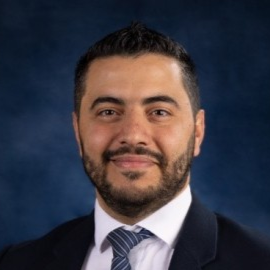
Dr. Seifeddine Bouallegue, UDST
BIOGRAPHY
Dr. Seifeddine Bouallegue is an accomplished academic and entrepreneur. He earned his Ph.D. in Computer Science Telecommunications and Electronics from Université Pierre et Marie Curie in France. He is now leading as the Head of the Department of Software Systems at the University of Doha for Science and Technology, Qatar. In addition to his academic pursuits, Dr. Bouallegue co-founded EButler, showcasing his entrepreneurial spirit and innovative mindset in the technology sector.
Title: AI-Augmented Software Engineering
Abstract: This lecture explores how AI technologies, particularly generative AI, are reshaping traditional software development practices. Attendees will gain insights into integrating existing GenAI models and tools—without focusing on AI training methods—for coding, analysis, testing, and design. Additionally, the practical workshop will showcase the development of an AI-powered system, demonstrating how AI can be seamlessly applied to accelerate and enhance the software development lifecycle.
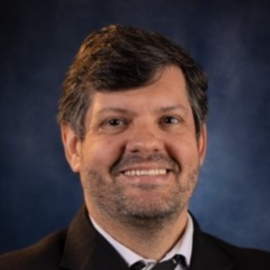
Dr. Vanilson Burégio, UDST
BIOGRAPHY
Vanilson De Arruda Burégio is an Assistant Professor of Software Engineering at UDST, holding a Ph.D., M.Sc., and B.Sc. in Computer Science. With over two decades of experience in software development across diverse industries, he has led the design and implementation of systems utilized by companies worldwide. His research interests include Software Engineering, Generative AI, and Social Machines.
Title: AI-Augmented Software Engineering
Abstract: This lecture explores how AI technologies, particularly generative AI, are reshaping traditional software development practices. Attendees will gain insights into integrating existing GenAI models and tools—without focusing on AI training methods—for coding, analysis, testing, and design. Additionally, the practical workshop will showcase the development of an AI-powered system, demonstrating how AI can be seamlessly applied to accelerate and enhance the software development lifecycle.
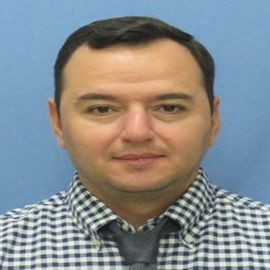
Dr Oussama Djedidi, UDST
BIOGRAPHY
Dr. Djedidi holds a PhD in Computer Engineering and Automation and is a Senior Data Scientist with expertise in the semiconductor, sensor, and glass industries. With a strong record in R&D, he specializes in AI-driven process control and implementing digital twins, contributing to advancements in data-driven models for process automation, real-time control algorithms in glass manufacturing, and sensor-based pollution detection. His research emphasizes applied machine learning, control engineering, and advanced modeling in smart systems.
Title: Generative Pretrained Transformer (GPT): from Theory to Implementation.
Abstract: The talk explores the foundational principles and practical applications example of implementing GPT models; the class of deep learning architectures revolutionizing natural language processing and computer vision. This talk begins with an overview examination of the theoretical underpinnings of transformers, including attention mechanisms, multi-layered architectures, and transfer learning. Attendees will gain insights into how pretraining on vast datasets enables GPT models to generate coherent and contextually accurate text or images. Moving from theory to practice, the session will cover basic implementation steps, challenges in model training, and considerations for deployment in real-world applications.

